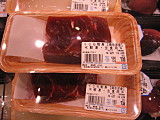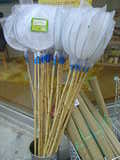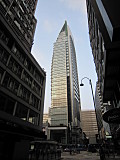Radioactive Food (2011-03-22)
For mainstream foreign media, Japan's nuclear crisis seems to have lost its juiciness although the problem is far from over (but seems to have stabilized). Now that reporters' attention is directed back to Libya and their madman Gadhafi, Fukushima power plant no longer dominates the headline. I sure hope U.S. Energy Secretary Steven Chu is right when he said the worst is probably over in Japan.While the nuclear cirsis is enormous, I think the foreign press have focused too much on it and largely under-reported on the real victims: the 20,000 missing or dead and the hundreds of thousands of people who have lost their home and the humanitarian help they need.
Bad news "sells" paper, sensationalized headlines and hyped-up words
get readers glued to it. Before people get all panicky AGAIN by
words like "Contaminated food", "Cancer-causing", "Questionable safety"
about the detected elevated level of radioactive particles in spinach
and milk near Fukushima Prefecture, they should spend some time
familiarizing themselves with subjects regarding food and radiation to
make informed decision about the danger (What is the international
standard on radiation and food? What is the effect on
health? How much is considered harmful?).
There is certainly risk to human health when consuming radioactive
food products over a long period of time. The responsible thing
everyone should do is to exercise caution and to keep abreast of the
latest data and results from reliable sources instead of believing
newspaper reports blindly and jumping into conclusion.
 ). Since it looks
like the nuclear reactor trouble is under control (I saw Cabinet Secretary
Edano Yukio smiled for the first time yesterday at a press
conference!), logically speaking, levels of radioactive materials
(iodine and cesium) in agricultural products and water should not get
higher. Let's hope so.
). Since it looks
like the nuclear reactor trouble is under control (I saw Cabinet Secretary
Edano Yukio smiled for the first time yesterday at a press
conference!), logically speaking, levels of radioactive materials
(iodine and cesium) in agricultural products and water should not get
higher. Let's hope so.The following sites are sources of information that I find useful:
Fear helps us survive, panic does not. I wouldn't go so far as
to say those who fled Japan at the first sight of trouble is behaving
irrationally, but it is certainly something a level-headed and
well-informed person doesn't do.
P.S. An interesting "assignment" for you: check to see the
radiation level in YOUR city. See if it's
higher than Tokyo!
Back to top






